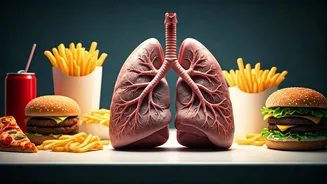Processed Meats
Processed meats often contain high levels of nitrates and nitrites, which are used as preservatives. When these chemicals are heated or consumed, they
can transform into nitrosamines, compounds known to cause inflammation in the lungs. Regular consumption of processed meats like bacon, sausages, and deli meats has been linked to increased risks of chronic lung diseases. These foods may trigger irritation and exacerbate symptoms in individuals with respiratory issues, making breathing more difficult. Cutting down on these foods, or choosing options with fewer additives, is a good start. Look for fresh, unprocessed alternatives whenever possible. Being mindful of these details allows for improved lung health.
Sugary Drinks
Excessive sugar intake can indirectly harm your lungs. Sugary drinks, including sodas, fruit juices with added sugar, and energy drinks, contribute to weight gain and obesity. Obesity puts extra pressure on the respiratory system, making it work harder. Increased body weight can lead to reduced lung capacity, which makes it harder to breathe efficiently. Moreover, sugary drinks often lack essential nutrients and can displace healthier food choices that support lung health. Reducing the amount of these drinks in your daily life can help support your respiratory system. Opting for water, herbal teas, or naturally flavored beverages will support healthier lung function and overall wellness.
Salty Foods
Foods high in sodium can contribute to fluid retention, which can be problematic for lung health. When the body retains excess fluid, it can accumulate in the lungs, making breathing more difficult. This is especially relevant for people with conditions like asthma or chronic obstructive pulmonary disease (COPD). High-sodium foods often include processed snacks, fast foods, and pre-packaged meals. Being aware of sodium content and making informed choices is crucial. Eating more fresh produce, cooking at home more often, and reading food labels can all help limit sodium intake and support optimal lung function. These changes can reduce inflammation and improve overall respiratory wellness.
Fried Foods
Fried foods are often high in unhealthy fats and can trigger inflammation throughout the body, including in the lungs. When the lungs become inflamed, it can cause airway constriction and worsen respiratory symptoms. Cooking methods that involve deep-frying also produce harmful compounds that can further irritate the lungs. Frequently eating fried foods can lead to chronic inflammation, making the respiratory system more vulnerable to infections and diseases. Reducing the intake of fried items and choosing healthier cooking methods, such as baking, grilling, or steaming, can lead to better health outcomes. These methods offer alternative ways to prepare foods, supporting both lung health and general well-being.
Dairy Products
For some individuals, dairy products can increase mucus production, which may worsen respiratory symptoms. While dairy does not affect everyone in the same way, some people find that consuming milk, cheese, and other dairy items can lead to congestion and make it harder to breathe. Excessive mucus can block airways, increasing the likelihood of coughing and infections. People who experience these effects may consider reducing their dairy intake to see if symptoms improve. There are also many dairy-free alternatives available. Experimenting with other options can help you identify if dairy products negatively affect your lungs and help find a more suitable diet.
Refined Grains
Foods made with refined grains, like white bread, white rice, and many baked goods, are often low in fiber and nutrients. These foods can cause blood sugar spikes and contribute to inflammation. Inflammation can impact the respiratory system, exacerbating respiratory conditions such as asthma. The lack of fiber in refined grains can also impact the gut, and gut health is closely linked to overall health. It is often recommended to choose whole-grain options. Whole grains provide more fiber and nutrients, support better blood sugar control, and may help reduce inflammation. These choices will contribute to better overall health and lung wellness.
Artificial Sweeteners
Some artificial sweeteners have been linked to potential health issues, including inflammation, which could affect the lungs. While the research is ongoing, some studies suggest that certain artificial sweeteners may disrupt the balance of gut bacteria and cause an inflammatory response. Inflammation may negatively impact the respiratory system, worsening pre-existing conditions. Considering the possible impacts, limiting the use of artificial sweeteners might be beneficial. Being mindful of your body’s reaction to these substances and making informed choices regarding food and beverages can support overall health and lung function. The better you understand the foods you consume, the better your ability to control your health.












